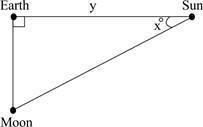
Mathematics, 16.10.2020 08:01 slawson4328
Prove the sum of two rational numbers is rational where a, b, c, and d are integers and b and d cannot be zero. Steps Reasons 1. a over b plus c over d Given 2. ad over bd plus cb over bd 3. ad plus cb all over bd Simplify Fill in the missing reason in the proof. Multiply to get a common denominator. Add to get a common denominator. Distributed to all terms. Add d to all terms.

Answers: 1


Another question on Mathematics

Mathematics, 21.06.2019 17:00
If you apply the changes below to the absolute value parent function, f(x)=\x\, which of these is the equation of the new function? shift 2 units to the left shift 3 units down a. g(x)=\x-3\-2 b. g(x)= \x-2\-3 c. g(x)= \x+3\-2 d. g(x)= \x+2\-3
Answers: 1

Mathematics, 21.06.2019 18:00
Darian wants to build a regulation size pool table that is 9 feet in length.he plans he ordered are 18 by 36 inches. what is the scale factor of the dilation he must use to build a regulation pool table
Answers: 1

Mathematics, 21.06.2019 18:40
Which compound inequality could be represented by the graph?
Answers: 1

Mathematics, 21.06.2019 21:50
The value of the expression 16-^3/4 8 1/8 -6 6 1/40 1/64
Answers: 1
You know the right answer?
Prove the sum of two rational numbers is rational where a, b, c, and d are integers and b and d cann...
Questions


Biology, 26.06.2019 10:00

Advanced Placement (AP), 26.06.2019 10:00

Biology, 26.06.2019 10:00


Mathematics, 26.06.2019 10:00




Mathematics, 26.06.2019 10:00


History, 26.06.2019 10:00



Mathematics, 26.06.2019 10:00








